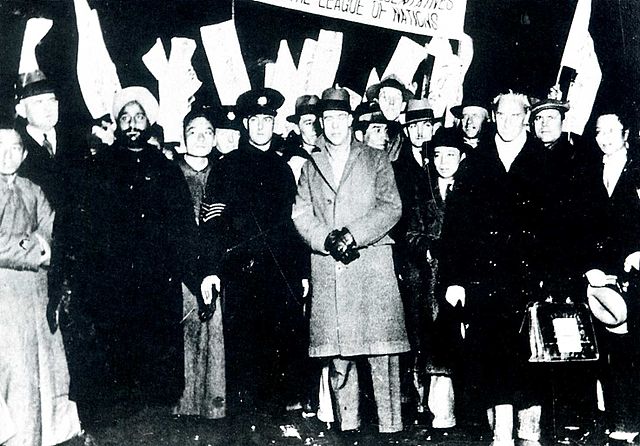李顿报告
来自维基百科,自由的百科全书
李顿报告(Lytton Report)是由国际联盟的李顿调查团在1932年发表的报告,用以协助调查及解决1931年的日本及中国之间发生的九一八事变。


调查始末
李顿调查团由英国的维克多·布尔沃-李顿,第二代李顿伯爵统筹。1931年12月,国联派出此小组到上海调查中国与日本在满洲的争端,以及九一八事件的始末。
在调查过程中,日方阻碍东北人民向调查团反映情况,但仍收到1500多件揭露日方罪行的信件。
1932年10月2日,小组发表报告,共有十万多字,指出日本明显是侵略者。报告中否定日本的行为是为了自卫,并指出满洲国之成立乃日本侵略中国之举动;“东三省为中国之一部,此为中国及列国共认之事实。”“日方之军事手段,不能认为合法之自卫手段。”承认东北是中国领土,建议东北地方自治,作为非武装地带,主张对东北实行国际共管。但又认为由于日本与满洲有经济联系,故此承认日本对满洲的关切是“无可厚非”。然而,它认为中国人民只是在已经沦陷的满洲煽动反日情绪,又反对与日本和议,无助解决问题。故此,满洲应该获得自治,但仍为中国控制。
但是小组调查期间,局势已经愈来愈恶劣。日本早已在1932年3月扶植溥仪做傀儡政权满洲国的皇帝。由于国联不承认满洲国为主权独立国家,日本撤出国联以表抗议。日本又不满调查团的报告,并在1933年5月27日正式发出通知,要求国联在两年之内结束调查。
李顿报告显示出国联的弱点,例如国联未能迅速应变,足足在六个多月后才发表报告。后在1933年2月7日,《国联特别大会关于中日争议报告书》用更明确的语言承认日本侵略中国的事实,并规定日本撤兵的方法、步骤期限等,但日本在调查团调查期间(1933年3月27日)撤出国际联盟。如此一来,报告只是纸上谈兵,完全不能让国联以外交途径介入及解决问题。
报告重点
李顿调查团报告揭露出炸毁部分南满铁路是关东军所为,戳破其以此为借口发动驻朝2000人军队的说辞。
延伸阅读
- * Chang, David Wen-wei. "The Western Powers and Japan's Aggression in China: The League of Nations and 'The Lytton Report.'" American Journal of Chinese Studies (2003) 19#1 pp 43–63.
- Jin, Wensi, and Wên-ssŭ Chin. China and the League of nations: the Sino-Japanese controversy (St. John's University Press, 1965).
- Kuhn, Arthur K. "The Lytton Report on the Manchurian Crisis." American Journal of International Law 27.1 (1933): 96-100. in JSTOR (页面存档备份,存于互联网档案馆)
- Nish, Ian Hill. Japan's Struggle with Internationalism: Japan, China, and the League of Nations, 1931-3 (Routledge, 1993).
- Saito, Hirosi. "A Japanese view of the Manchurian situation." The Annals of the American Academy of Political and Social Science 165 (1933): 159-166. in JSTOR (页面存档备份,存于互联网档案馆)
- Walters, Francis Paul. A History of The League of Nations. London, UK: Oxford University Press, 1960. pg 491-492. That book is freely available on the site of the United Nations Office in Geneva online (页面存档备份,存于互联网档案馆)
外部链接
您可以在维基文库中查找此百科条目的相关原始文献:
Wikiwand - on
Seamless Wikipedia browsing. On steroids.
